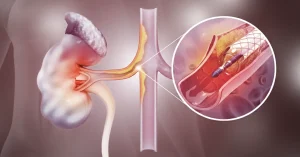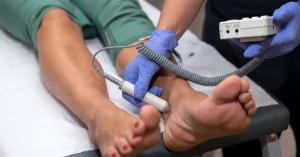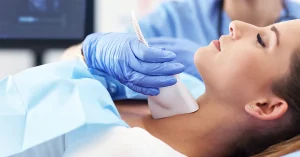Thyroid surgery is a common procedure. Many people develop or will develop a thyroid condition during their lifetime. Surgical procedures at the Venart Clinic are performed with maximum efficiency, prioritizing minimally invasive techniques to ensure rapid recovery and a very low risk of infection.
While some patients respond to non-invasive treatment, others require surgery. Regardless of the type of thyroid surgery, adjusting your diet after surgery is essential. Breaking old habits can be a decisive factor in recovery, and failure to follow dietary recommendations can reduce quality of life.
The First Step: Diet Immediately After Thyroid Surgery
For a few days after thyroid surgery, patients may experience numbness and swelling in the throat. Some may also have difficulty swallowing. Until this discomfort subsides, soft foods that are easy to swallow should be consumed. Examples include:
- Sauces and soups
- Mashed or finely chopped meat or meatballs
- Mashed or finely chopped vegetables or blended vegetables
- Nutritious drinks
Hard foods and raw vegetables should be avoided. Hot foods and drinks are not recommended, as they may aggravate the sore throat. Once the throat heals, the diet can be gradually adjusted to support recovery. Healthy and nutritious foods promote faster healing and proper nourishment.
Foods to Include During the Recovery Period
- Berries (strawberries, blueberries, grapes, pomegranates) – provide antioxidants and vitamin C
- Fresh vegetables (potatoes, carrots, cauliflower, broccoli) – provide carbohydrates and vitamins A and C
- Fresh fruits – supply vitamins, fiber, and antioxidants
- High-fiber foods (whole grains, fruits, vegetables, cereals) – help prevent constipation
- Protein-rich foods (chicken, turkey, pork, seafood, nuts, tofu, beans) – support tissue repair
- Vitamin B sources (meat, seafood, eggs) – maintain adequate blood cell levels; vegetarians may need supplements
- Water – sufficient daily intake prevents dehydration and constipation
Foods to Avoid That Can Cause Constipation
- Dairy products
- Dry or dehydrated foods
- Processed foods
- Red meat
It is recommended to start this diet a few weeks before surgery. This ensures a smoother transition and reduces the need for significant dietary changes postoperatively.
Thyroid Surgery and Metabolism
After thyroid surgery, hormone replacement therapy is prescribed. It may take time to determine the correct dosage. Thyroid hormones regulate metabolism, and insufficient production (hypothyroidism) can slow metabolism, reducing the number of calories the body burns. This often results in weight gain.
Leptin Resistance
Patients with thyroid disease may experience leptin resistance. Leptin regulates appetite by signaling hunger and satiety while stimulating thyroid hormone production to support metabolism. Excess leptin reduces sensitivity, sending confusing signals to the brain and telling it that the body is hungry when it is not. Leptin resistance may persist even after surgery, making weight management more challenging. This condition is similar to insulin resistance seen in obesity.
Timely Dietary Changes After Thyroid Surgery
After the thyroid or part of it is removed, metabolism may change. Weight gain may occur while hormone levels stabilize. Adjusting your diet can help avoid fluctuations during this period. Maintaining a healthy diet supports the recovery process and overall metabolic health.
Recommended Foods After Thyroid Surgery
After the recovery period, dietary restrictions are minimal. Following a healthy diet prevents weight gain and supports long-term wellbeing. In addition to foods eaten immediately after surgery, the following foods are recommended:
- Eggs – provide protein, vitamins A and E, zinc, calcium, iron, and folic acid
- Healthy fats (nuts, avocado, coconut oil, olive oil, seeds) – provide energy and vitamin E
- Green leafy vegetables (spinach) – supply vitamins A, C, E, K, fiber, iron, calcium, potassium, and magnesium
- Probiotics (kefir, pickles, sauerkraut, yogurt) – support gut health and overall vitality
- Salmon – provides omega-3, protein, vitamins, selenium, zinc, and iron
- Organ meats – rich in vitamin A, zinc, iron, vitamin B, and copper
Avoid milk and calcium supplements unless prescribed. Dietary supplements should always be supervised by your doctor. Consult your doctor if you need antacids or acid reducers to ensure correct dosing.
Thyroid Gland Treatment: What Is Thyroidectomy?
Thyroid surgery treats various thyroid conditions and can improve overall health. Postoperative lifestyle and diet influence recovery and long-term quality of life. Starting a healthy diet before surgery and continuing afterward helps the body heal and adapt.
The Venart Clinic team has extensive experience in thyroid surgery. Schedule a consultation to learn about surgical stages, procedure details, and recovery expectations. Our doctors are ready to answer all questions and provide professional guidance. Talk to our thyroid specialists at VenArt Clinic to receive personalized dietary guidance and ensure a safe, effective recovery.
Recommended Articles:











